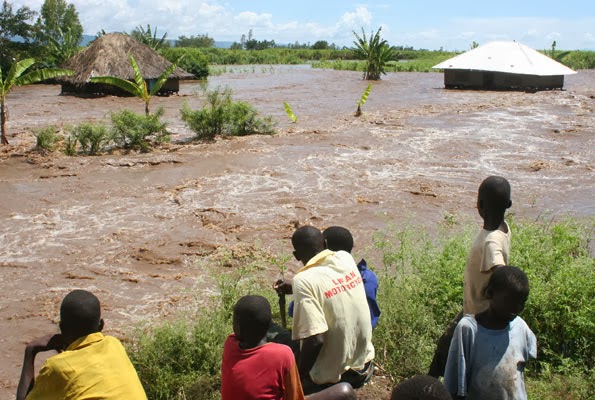Residents of flood prone Budalang'i Constituency in Busia County have
embarked on a project that aims at helping them deal with perennial flooding.
The project involves the construction of ‘flood proof houses’.
The new measure has been necessitated by the delay in the construction of
new dykes.
Plans to construct the dykes started in 2008 but the residents are yet to
see the promise fulfilled.
The houses are constructed with a raised foundation up to 4 feet high
depending on the flood water level of at particular area.
“The houses are being constructed with a foundation four feet high and
sometimes even higher depending on the water level in that particular area,”
says says Mr Michael Gonjo the vice-chairman of the Community based Disaster
risk reduction extension service providers (DRESP).
"Even though they are not permanent, we use stones and cement to raise
the foundation to make it strong,” he adds.
PILOT PROJECT
Mr Gonjo says that under the pilot project they have managed to constructs
ten houses and are planning to put up more houses as they await the
construction of the new dykes.
He notes that the group has been tasked with reducing the risks of flooding
in the area through educating the community in an area that has witnessed
flooding since independence.
“We carry out flood campaigns by educating our people on how to co-exists
with the waters and minimise the wastage that comes as a result of flooding in
the area,” says Mr Gonjo.
He observes that during the floods the community normally incurs huge losses
due to destruction of property.
“We are now going to villages and helping people construct flood proof
houses. When we get more funds we will put up more houses,” says Mr Gonjo.
According to him, the initiative can be replicated in other areas that are
affected by flooding such as Siaya County.
Mr Gonjo laments that most of the houses in the area were destroyed in April
2013 after water from River Nzoia rose to seven metres which was the highest
ever.
Locals managed to contain the water before it could cause more havoc.
INDIA TOUR
He says that the technology that they are applying now was learnt in India
in 2008 when they made a familiarisation tour to learn on how the people of
India were dealing with flooding.
Clementina Oduki a resident of Mukhobola is a beneficiary of the initiative
of the flood proof houses and is happy that even if floods occur, she would be
able to save some items which previously would be destroyed by floods.
The initiative has been supported by Western Kenya Community-Driven
Development and Flood Mitigation (WKCDD/FM) Project and which is funded by the
government of Kenya in collaboration with the World Bank.
Mr Gonjo says they have decided to embark on construction of the water proof
houses as they wait for the government to construct new dykes in the area.
The construction of dykes was set to have commenced in 2008.
But the project was halted for a year after the main financer, the World Bank,
withdrew its support citing misappropriation of funds.
Budalang’i MP Ababu Namwamba says that efforts to put up a new set of dykes
in Budalang’i Constituency need to be accelerated in order to prevent further
flooding in the area.
“I believe they are through with the prequalification process and soon they
will advertise for a contractor and it’s our hope that once the contract is
awarded the work should be done with speed,” says the MP.
CONTAIN FLOODS
“We will have a new set of dykes that will have a combination of technology
as well as concrete and we believe that this new approach will help contain
floods forever,” the MP added.
His sentiments were shared by Busia community development organisation
(Bucodev) Programme coordinator Thomas Mango, who said that the area needs a
new set of dykes to replace the current dykes which are now old and weak.
Mr Mango says that several families are also set for relocation once the
construction of the dykes starts as there will be a 50 metres buffer zone that
will be constructed around the dykes.
“There will be a 50 metres buffer zone and that means eviction of families. Unfortunately no efforts are being made to resettle those who will be
evicted,” lamented Mr Mango.
Mr Mango further lamented that a lot of money had been spent on research and
seminars at the expense of real work which is the construction of the dyke.
“The community wants to see new dykes in place so that the suffering they
have experienced for years ends once and for all,” said Mr Mango.
“It is sad that the government does not adhere to the set standards and
specification of such works. The community must be involved at all levels,”
says Mr Mango.
Western Kenya Community-Driven Development and Flood Mitigation Busia
District Co-coordinator Shadrack Maloba says the new design for the dykes and
dams are complete.
“We are waiting for the procurement of the contractor so that the work can
start,” says Mr Maloba.
PERMANENT DYKES
According to government officials the two dykes - referred to as the
Southern and Northern dykes are being re-designed - to make them permanent.
He says that the project duration should be extended in order to recover
time that was wasted when the project was suspended.
Mr Maloba said the design for the construction of the dykes was yet to be
made public and wondered when the construction will begin.
“We saw an advert about the design and construction of the dyke but we are
yet to be told if the construction tender has already been awarded.
We hope the tender will be awarded to an international company,” said Mr
Maloba.
The Northern and Southern dykes are each about 18.6 kilometres long
Adapted from Nation Online

















